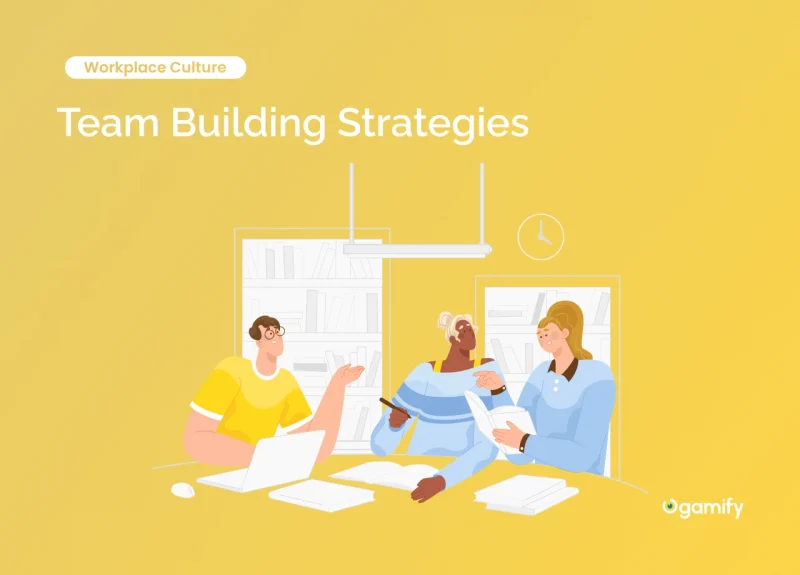The value of team development in today’s hectic and competitive corporate world cannot be emphasized. For organizations to succeed and support innovation, productivity must be increased by creating productive teams. But what is a team builder in particular, and why team building is important in business?
This comprehensive guide will examine the team building definition and its importance and discuss five key tactics for creating effective teams. We’ll also go through the different stages of building an a team, give examples of effective efforts, and talk about the value of team bonding and how it affects performance.
What is Team Building?

Team development is important to foster a cohesive and high-performing team within the workplace. It involves the strategic process of building a new team while emphasizing the significance of effective teamwork strategies. Constructing an “A team” necessitates deliberate efforts to assemble individuals with complementary abilities, diverse perspectives, and shared objectives.
The importance of team building cannot be overstated in the realm of business. It is crucial for cultivating a positive work ethics, enhancing synergy, and fostering effective communication. By investing in entire team building activities and initiatives, organizations can unlock the potential for business team success and elevate overall workforce performance. So, what does team building meaning? It is the art of forging a cohesive and harmonious team equipped with the skills and strategies necessary to thrive in today’s competitive landscape.
Why Team Building is Important in the Workplace?

Building your team in business plays a crucial role in fostering a cohesive and productive work environment. It encompasses a range of activities and strategies for teamwork aimed at enhancing collaboration, communication, and synergy among employees. The meaning of team building extends beyond mere social interactions; it involves deliberate efforts to build the team and create a sense of unity.
In business, team building description is defined as developing a group of individuals into a cohesive unit that works together towards achieving common goals. Building a better team is not a one-time event but an ongoing process requiring continuous investment. By implementing effective team building strategies in the workplace, organizations can unlock numerous benefits and drive their success.
Benefits of Effective Team Building

Team building reasons in the workplace hold paramount importance for several compelling factors. Firstly, it promotes organisational transparency by fostering open communication and trust among team members. This transparency cultivates a collaborative environment where ideas and feedback can flow freely, leading to enhanced problem-solving and innovation.
Moreover, strategic team building actively promote teamwork, emphasizing the significance of collective effort and synergy in achieving common goals. By encouraging collaboration and interdependence, diverse teams can harness the perspectives and skills of individual members, resulting in improved productivity and outcomes.
Respect is another key aspect that team development addresses. It instils a culture of mutual respect and appreciation for each team member’s contributions and talents. When team members experience a sense of value and respect, their engagement and motivation levels are elevated, ultimately resulting in greater job satisfaction and reduced turnover rates. Furthermore, team building events contribute to improving culture by fostering a positive and supportive atmosphere.
6 Strategies and Tips for Successful Team Building

Foster Team Development
To build a great team, prioritize team development strategies that focus on nurturing the growth and potential of each team member.
Provide opportunities for skill-building, encourage knowledge sharing, and offer mentorship programs. This investment in individual growth enhances the team’s overall strength and contributes to long-term success.
Promote Team Bonding
Recognize the importance of team bonding as a catalyst for enhanced collaboration and productivity. Encourage social interactions and create a supportive environment where each team member can connect personally.
Foster team-building activities that inspire creativity and facilitate genuine connections among team members, leading to stronger relationships and improved performance.
Emphasize the Importance of Communication
Effective communication is vital for team development. Encourage open and honest communication among team members by establishing clear communication channels and promoting active listening.
Create a culture that values diverse perspectives and encourages constructive feedback. Regularly hold team meetings and encourage dialogue to ensure everyone is aligned and informed.
Set Clear Goals and Expectations

A key aspect of building teams in business is setting clear goals and expectations. Clearly define the team’s purpose, objectives, and performance expectations.
Ensure each team member understands his or her roles and responsibilities, and provides them with the necessary resources and support to achieve goals. Regularly evaluate progress and provide feedback to keep the team motivated and focused.
Encourage Inspirational Team Building
Inspire your team by incorporating elements of inspirational team building. Engage in activities encouraging personal and professional growth, such as attending workshops, participating in team challenges, or inviting guest speakers.
Foster a sense of shared purpose and vision, allowing team members to feel motivated, connected, and inspired to achieve extraordinary results together.
Use gamification mechanics
Gamification has been more popular in several industries, including marketing and education. However, its advantages go beyond these fields and can be efficiently applied to creating and growing a high-functioning team.
Organizations may create an engaging and dynamic atmosphere that encourages collaboration, workplace motivation, and skill development by gamifying team-building exercises. One such platform is Ogamify, which was developed to support team integration and develop a positive corporate culture while using gamification.
Phases of the team building process

To cultivate an effective team that thrives in the workplace, it is essential to embark on the process of team management, which encompasses various critical stages. Building effective teams and fostering a collaborative, high-performing environment hinges upon successfully comprehending and navigating these phases.
Firstly, the team developing the definition of business should consider its significance within the organization. This involves recognizing the importance of team building, establishing clear goals, and aligning strategy for team building with overarching business objectives.
The formation of the entire team constitutes a crucial initial step. This phase involves assembling diverse individuals with various skills and backgrounds capable of contributing to the team’s success. During this stage, team members begin to forge relationships, understand their respective roles, and cultivate a sense of initial cohesiveness.
Next, it becomes imperative to establish team standards. Defining the guidelines or norms that govern team performance and interactions is a pivotal aspect of effective team building. This phase fosters a shared understanding of expectations, communication preferences, decision-making approaches, and conflict-resolution strategies. Such clarity nurtures cooperation, promotes a positive workplace culture, and sets the stage for fruitful collaboration.
Enhancing collaboration is another vital facet of developing a team. Employing team strategies that foster open communication, active listening, and idea exchange is key during this phase. By fostering an environment that encourages collaboration, teams can leverage diverse perspectives and skills, enhancing innovation and effective problem-solving.
To sustain and develop the team, it is crucial to employ effective team building strategies continuously. This encompasses ongoing team development techniques such as coaching, training programs, and opportunities for professional growth. Regular assessments and feedback facilitate ongoing improvement and support the team’s continual development.
Examples of Successful Team Building Initiatives

Successful team building initiatives can have a profound impact on team dynamics and overall performance in the workplace. Here are a few examples of effective team building strategies that have yielded positive results:
Adventure-based Team Building
Engaging in adventure activities, such as participating in outdoor challenges, conquering obstacle courses, or embarking on team retreats, provides a thrilling opportunity to foster camaraderie and build an unbreakable bond among team members.
By venturing into unfamiliar and challenging environments, team members are compelled to collaborate, think critically, and communicate effectively to overcome obstacles and achieve common goals. The shared adrenaline rush and the collective effort required to navigate these adventures create lasting memories and a deep sense of trust among team members.
Volunteer Work
Engaging in community service or volunteering as a team contributes to a greater cause and fosters the growth of strong team bonds, creating a lasting impact. By coming together for a shared purpose outside the workplace confines, team members can develop and nurture essential qualities such as empathy, collaboration, and a profound sense of pride.
These experiences go beyond enhancing team dynamics; they provide a platform for personal growth, instilling a sense of purpose and fulfilment within each team member.
Cross-Department Collaboration

Facilitating collaboration between different departments or teams within an organization promotes a deeper understanding of each other’s roles and challenges.
Team members develop a broader perspective, enhance communication skills, and build valuable relationships by encouraging cross-departmental projects or joint problem-solving sessions.
Team-Building Workshops
Conducting specialized workshops focused on effective teamwork strategies can provide team members with valuable tools and techniques. These immersive sessions cover conflict resolution, active listening, and goal setting, fostering shared understanding.
Through experiential learning, participants gain practical skills to navigate conflicts, enhance listening, and achieve collective goals. These workshops also foster camaraderie, promoting collaboration and effective communication among team members.
Team-Building Games and Challenges
Engaging in interactive games or challenges specifically designed to promote teamwork and problem-solving can be highly effective. Examples include escape rooms, scavenger hunts, or role-playing activities encouraging collaboration, creativity, and effective decision-making.
These examples demonstrate the importance of team building in the workplace and how it can improve performance and foster a positive team culture. Organizations can build strong, cohesive teams that drive business success by implementing such initiatives and building an environment that values teamwork.

Conclusion
In conclusion, team development in the workplace holds significant importance for businesses aiming to thrive and succeed in a competitive environment. The team builder meaning extends beyond a mere description; it involves implementing strategies to build a better, high-performing team. Organizations can cultivate an A-team that drives business success by strategically focusing on team building and developing effective teamwork strategies.
The team building process is pivotal in forming and strengthening teams, fostering collaboration, and achieving business team success. It encompasses the strategic planning and execution of activities to build a cohesive and efficient team. By understanding the importance of building teams that work and actively working on developing them, organizations can pave the way for a thriving and harmonious work environment, leading to long-term success.
FAQ
What are some common challenges in building effective teams?
Common challenges in building effective teams include conflicts or lack of collaboration, miscommunication, inadequate resources, and a lack of trust or accountability. These challenges can be addressed through open communication, clear roles, trust-building activities, and providing the necessary support and resources.
How can leaders foster team effectiveness?
Leaders play a crucial role in fostering team effectiveness. They should set clear expectations, provide guidance and support, facilitate open communication, and lead by example. It is important for leaders to create a positive team culture and create opportunities for collaboration and growth.
How can team members contribute to team effectiveness?
Team members can contribute to team effectiveness by actively participating in team activities, supporting their colleagues, communicating openly, and taking ownership of their responsibilities. They can also offer their ideas and perspectives, collaborate with others, and continuously seek personal and professional growth.
What are the benefits of building an effective team?
Building an effective team leads to numerous benefits, including improved productivity, higher-quality work, increased innovation, enhanced problem-solving capabilities, higher employee satisfaction, and stronger organizational performance. Effective teams create a positive work environment and contribute to a culture of continuous improvement.


